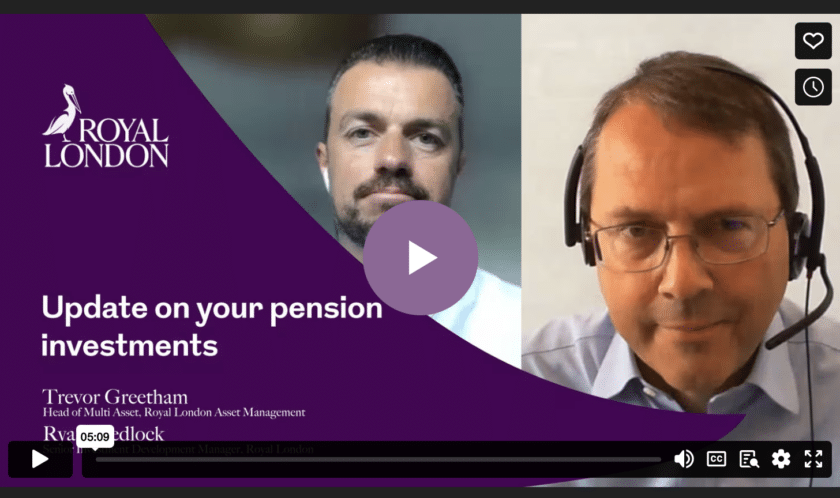Royal London investment experts, Trevor Greetham and Ryan Medlock, have recorded a webinar on what’s been happening in markets and the impact that this has had on pension investments.
Over the past couple of years, financial markets have been volatile on the back of global events such as the pandemic and the war in Ukraine, plus rising inflation and interest rates. There has been concern around some short-term falls in the value of pensions as a result.
Ryan Medlock spoke to Trevor Greetham, who’s head of the team at Royal London Asset Management which manages the portfolios where many of the assurer’s pension customers are invested, to find out what’s been happening and what impact this has had on investments. Trevor also gives his thoughts on what could happen in markets over the rest of this year and into 2024.
What’s covered in the video
- Why pension investment values have fallen over the last year
- The benefits of having a diversified investment portfolio
- What might happen in markets over the rest of this year and into 2024
You can access the webinar HERE.
OR read the transcript below.
Ryan Medlock: Against the backdrop of rising inflation and interest rates, coupled with frequent bouts of volatility, conventional attitudes towards investing have been challenged over the last months or so.
A lot of people will have seen falls in their pension values over the last year or so, particularly those in lower risk portfolios. So can you perhaps start by explaining why that has happened?
Trevor Greetham: Over the medium and longer term, pension values have increased a lot, as you know. But over the last year, what we’ve seen is the effects of rising interest rates, particularly on the fixed income part of the portfolio, has caused a drop in values, particularly at the lower risk end of the spectrum where the portfolios have got more in bonds.
Of course, bonds generally are lower risk investment than company shares, which are much more volatile. But when interest rates are rising, the interest rate expectations are rising. There can be a change in capital values and that’s what we’ve seen. So the bonds have lost value over the last year or so. The stocks not so much. They were quite weak last year, particularly the US technology stocks, but they’ve actually bounced back very strongly.
RM: I think for me this particular phase of the business cycle is really highlights that the benefits of broad, diversification. Could you perhaps elaborate on why a diversified investment portfolio can help mitigate the impact of inflation and market shocks?
TG: Yes, I mean, you don’t put all your eggs in one basket. So if you look at the portfolios that we manage, we’ve got some assets in the portfolios designed to generate long term growth and those would be company shares both in the UK and internationally, also commercial property. And those asset classes have beaten inflation by a very wide margin over the long run. We’ve also got assets like commodities which could help to hedge against short term inflation shocks.
So this big cost of living crisis we’ve seen, that commodity exposure has been really beneficial. Commodity prices in sterling terms have risen by about 30% two years running. And then you’ve got the fixed income part of the portfolio, which is a like a shock absorber. It tends to be lower volatility and that helps to reduce the sort of day-to-day fluctuations in the portfolio.
All of these asset classes make sense over the long run. In the shorter term, sometimes one is doing badly, like we’ve seen with bonds, but others are doing well at the same time. So having that mix really gives you a smoother journey.
RM: Okay. Crystal ball time. So looking ahead to the end of 2023, and as we perhaps progress into 2024, what can we expect from the rest of this year?
TG: Well, life is always very uncertain. So the key point is we always start with that basic diversified portfolio, designed to be at the right sort of level of risk for different investors’ risk appetites. But at the margin, we’re active managers, so we will shift money between asset classes on a tactical basis.
And at the moment, we’ve shifted our money, if you like, overweight shares. We bought equities during the mini budget crisis last year, which was a real market low, and we’ve been overweighted in the funds since then.
And what we’ve seen is some economic recovery. You wouldn’t get too excited by it, but it’s better than people thought last year that we’d be seeing by now. And you’ve seen inflation, particularly in America, come down. That’s also been a benefit.
Where we head from here is always difficult. At the moment, the markets are trading on the basis of the belief that the US can avoid a recession. We’re not so sure the US and other economies will avoid recessions after all of these interest rate rises. So we’re watching very closely and if we see signs of a broad slowdown from this level in the world economy, what we’re likely to do is then de-emphasise the equity markets the company shares and move money at the margin back into government bonds.
Now, a couple of years ago, when government bond yields were very low, there was risk of losses and we were actually underweight in bonds last year as interest rates rose. But if we go into a weaker period, central banks may start cutting interest rates and then the bonds will do well.
So the bonds tend to be more defensive in the slowdown. So at the moment, overweight shares, if we see signs of a move towards recessions as the year progresses, then we’re likely to overweight government bonds.



































